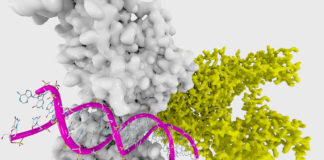Tag: epigenetics
Study Links Antidepressants and Decreased Coping Behaviors Across Generations
Biologists found that exposure to antidepressants suppresses important survival behaviors in zebrafish, an effect that persisted across three generations and was found to be more severe for males.
Early Life Experience: It’s In Your DNA
From Scientific American: "We know that the activity and organization of the brain changes in response to experience. Memories and learning are reflected in the...
Large Study Finds Epigenetic Changes Associated with Trauma Explained by Smoking
A new study suggests that epigenetic changes that have been associated with trauma may actually be due to environmental toxins.
How Our Ancestors’ Trauma May Influence Who We Are
In this blog post, Dale M. Kushner explains how the field of epigenetics can illustrate the role of ancestral and transgenerational trauma in shaping our...
When is Stress Good for You?
In this piece for Aeon, Bruce McEwen discusses how "good stress," "tolerable stress," and "toxic stress" act epigenetically on our brain structure, and how we can...
Schizophrenia Twin Research as Reported in The Gene: An Intimate History...
In his 2016 book The Gene: An Intimate History, cancer physician and researcher Siddhartha Mukherjee chronicled the initial idea of the gene, taking readers through the history of genetics up to the current “post-genome” period by interweaving science, social history, and his own personal narrative. In the process he documented some of the crimes of the eugenics movement and the monstrous atrocities committed by German National Socialism in the name of eugenics and biology, while noting the Nazi’s promotion of twin research. He also criticized aspects of intelligence testing and genetic theories of racial inferiority based on IQ tests. At the same time, Mukherjee supported and promoted many contemporary behavioral genetics positions.
Schizophrenia and Genetics: A Closer Look at the Evidence
“The substantial hereditary component in schizophrenia,” a pair of researchers wrote in 1993, “is surely one of the two or three best-established facts in psychiatry.” But is it really? For mainstream psychiatry and psychiatric genetics, schizophrenia is “a severe mental disorder with a lifetime risk of about 1%, characterized by hallucinations, delusions and cognitive deficits, with heritability estimated at up to 80%,” or a “highly heritable neuropsychiatric disorder of complex genetic etiology.” Many commentators have challenged these claims, and some have challenged the concept of schizophrenia itself.
“Loneliness May Warp Our Genes, And Our Immune Systems”
NPR reports how loneliness can change our bodies and affect our physical and mental health. "There are things we can do to get out of a depressed or lonely state, but they're not easy," they report. "Part of the reason is because these negative psychological states develop some kind of molecular momentum."
“Can You Think Yourself into a Different Person?”
Will Storr, for Mosaic Science, wades into the world of neuroplasticity and explores to what extent our brains are capable of changing through adulthood. He asks if the tendency to overemphasize the findings of epigenetics and neuroplasticity isn’t tied to our cultural belief that individuals are totally free to create themselves and pursue the American dream.
“Nature and Nurture: Human Brains Evolved to be More Responsive to...
"We found that the anatomy of the chimpanzee brain is more strongly controlled by genes than that of human brains, suggesting that the human brain is extensively shaped by its environment no matter its genetics," said Aida Gómez-Robles, postdoctoral scientist at the GW Center for the Advanced Study of Human Paleobiology and lead author on the paper. "So while genetics determined human and chimpanzee brain size, it isn't as much of a factor for human cerebral organization as it is for chimpanzees."
“The Curious Case of the Antidepressant, Anti-Anxiety Backyard Garden”
“My vegetable beds have even buoyed me through more acute stressors, such as my medical internship, my daughter’s departure for college, and a loved one’s cancer treatment,” writes Dr. Daphne Miller. Now neuroscientists are attempting to study the antidepressant effects of soil microbes in hopes of unlocking the secrets of a powerful mood enhancer.
“The Life and Times of Strider Wolf”
In the Boston Globe, Sarah Schweitzer tells the story of a young boy brutally abused by his parents then given to his grandparents who struggled with extreme poverty and homelessness. “Researchers now understood that trauma could alter the chemistry of developing brains and disrupt the systems that help a person handle stress, propelling a perpetual state of high alert. The consequences could be lifelong. As an adult, he’d be more likely to suffer anxiety and depression and heart disease and stroke. His ability to hold a job, manage money, and make good decisions could be compromised. And there was evidence, controversial but mounting, that he could pass on these traits to his children.”














